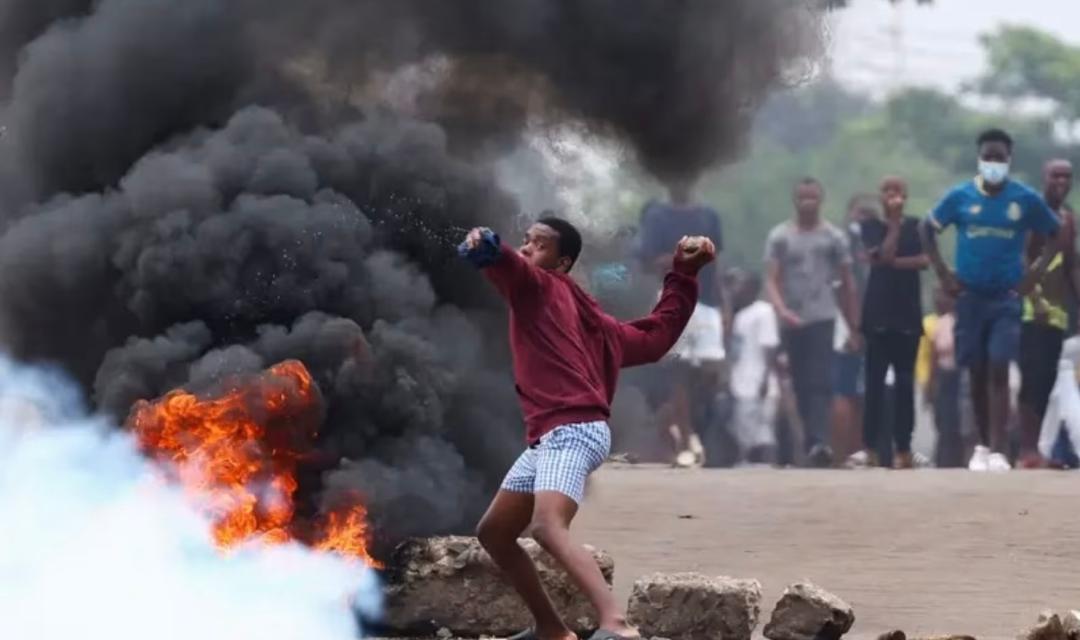Regional leaders of the Southern African Development Community (SADC) have instructed the bloc’s Panel of Elders to engage with the Mozambican government and key opposition leaders on the post-election unrest in Mozambique.
Mozambique is reeling from violence and disruptive protests following its disputed elections in October 2024.
The leaders discussed the crisis in the southern African nation during a virtual summit of the SADC organ troika, which deals with security crises in the region, on 5 January.
The organ was chaired by Tanzanian president Samia Hassan.
Zambian president Hakainde Hichilema and Malawian president Lazarus Chakwera, the other members of the troika, attended the meeting, as did Mozambican president Filipe Nyusi and SADC executive secretary Elias Magosi.
In mandating the bloc’s Panel of Elders to facilitate engagements between Mozambican government authorities and opposition leaders, the leaders went further than Hassan had in a statement she issued on the festering crisis in Mozambique on 31 December.
In that statement, Hassan had called for all parties to “exercise restraint and refrain from actions that escalate violence and unrest”, and said the SADC was ready to assist in facilitating a resolution to the unrest.
The statement from Sunday’s summit said the SADC had instructed its Panel of Elders to intervene and report back to the chairperson of the organ by 15 January.
The leaders also directed the inter-state defence and security committee “to propose measures to protect the regional trade routes, humanitarian corridors, and energy supplies while finding solutions to the political and security challenges in the Republic of Mozambique,” according to the statement.
In her opening statement, Hassan said the SADC region could “not afford to turn a blind eye to what is happening” in Mozambique, “especially when it directly impacts the socio-economic fabrics of our societies”.
There have been ongoing protests in Mozambique since the October 2024 legislative and presidential elections, which were marred by accusations of vote rigging. Mozambican electoral authorities declared the ruling Frelimo party and its presidential candidate, Daniel Chapo, as comfortable winners, but opposition candidate Venâncio Mondlane and his Podemos party insisted that he had won.
On 23 December, Mozambique’s Constitutional Council validated the electoral count and Frelimo’s win, triggering a fresh wave of violence in the country.
Frelimo, in power since Mozambique’s independence from Portugal in 1975, has responded to the demonstrations with violence and a throttling of internet access. At least 252 people have been killed during the demonstrations since the polls, according to a Reuters report.
The SADC summit between regional leaders on Sunday comes as neighbouring countries continue to feel the impact of the violent unrest. In a statement issued on 31 December, the United Nations Refugee Agency (UNHCR) said more than 2 000 people had fled Mozambique into neighbouring Malawi, while another 1 000 had fled to Eswatini as a result of the unrest.
“We are deeply alarmed by the ongoing situation in Mozambique, where escalating violence has forced thousands to flee. Refugees and civilians are facing immense risks, losing their livelihoods and relying on humanitarian assistance,” said Chansa Kapaya, UNHCR’s regional director for southern Africa.
The UN agency said the situation in Malawi and Eswatini was “becoming critical, with the rising number of refugees and asylum seekers straining already overstretched resources”.
SOUTH AFRICAN ENVOY
The crisis in the southern African nation has big economic and social implications for South Africa and the region.
South Africa (SA) is Mozambique’s largest trading partner in the SADC region.
In November, SA temporarily closed the Lebombo port of entry, its main border crossing with Mozambique, over security concerns after protests escalated. The Road Freight Association said the disruptions at the ports of entry cost South Africa R10 million a day.
After the Constitutional Council’s ruling on the validity of the electoral count, the South African National Joint Operational and Intelligence Structure (NatJoints) stepped up operations on the South Africa-Mozambique border amid fresh protests.
South African international relations and cooperation minister Ronald Lamola in a statement after the council’s proclamation called for an urgent dialogue between all parties to resolve the unrest to “heal the country and set it on a new political and developmental trajectory”.
Lamola said SA was “ready to assist Mozambique in any manner to facilitate this dialogue”.
On 27 December, president Cyril Ramaphosa’s envoy, national security adviser Sydney Mufamadi, met Nyusi in Maputo for talks on the growing crisis.
According to a press statement issued by Nyusi’s government, Mufamadi had “brought a message of solidarity on behalf of the South African government and people”.
The conversation focused on the “serious situation” in Mozambique, and the impact of the violence on the “interconnected economies” of Mozambique and South Africa, according to the statement.
“President Ramaphosa’s envoy has emphasised the importance of joint efforts to alleviate the burden posed by this situation and identify peaceful and sustainable solutions,” it continued.
On Monday, South African Presidency spokesperson Vincent Magwenya told Daily Maverick that engagements with the Mozambican authorities were ongoing.
MONDLANE’S RETURN TO MOZAMBIQUE
Mondlane vowed on Sunday to return to Mozambique to lead a fresh wave of demonstrations as the country prepares to swear in Chapo on 15 January.
Mondlane had previously fled Mozambique after the October elections and is in hiding over security fears.
He said he was returning to implement the last phase of “spearhead” demonstrations.
Mondlane told supporters in a Facebook Live broadcast at the weekend that he would be at Maputo’s Mavalane airport on 9 January.
“I invite the Mozambican people to come and welcome me at Maputo International Airport. I invite the president of the republic, government institutions and civil society to attend my reception,” he said.
“My return is to put an end to the crimes Frelimo has been committing. This is our country. Save Mozambique,” he said.
– Daily Maverick
Stay informed with The Namibian – your source for credible journalism. Get in-depth reporting and opinions for
only N$85 a month. Invest in journalism, invest in democracy –
Subscribe Now!










